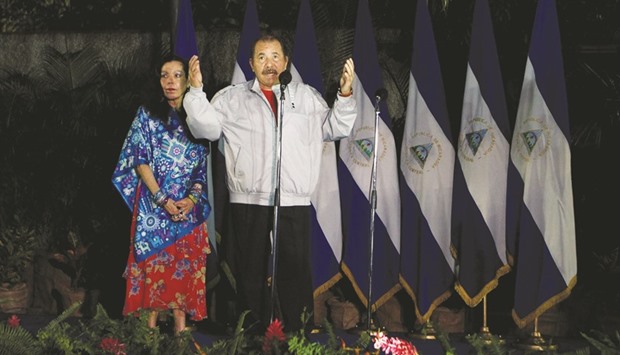Nicaraguan leftist Daniel Ortega powered to his third consecutive term as president of the poor Central American country, as voters cheered years of solid economic growth and overlooked criticism he is installing a family dynasty.
By fusing his militant past with a more business-friendly approach, Ortega stands in stark contrast to many once-dominant Latin American leaders, whose popularity has plummeted in recent years after failing to guarantee gains in economic prosperity.
The 70-year-old former guerilla fighter, who ran with his wife, Rosario Murillo, as vice president, had 72.1% of the votes, with 66.3% of polling stations counted, the electoral board said.
The announcement sent hundreds of his Sandinista National Liberation Front (FSLN) party supporters out into the streets of Managua to celebrate.
Ortega’s main opponent, the centre-right Liberal Constitutionalist Party (PLC) candidate Maximino Rodriguez, was a distant second with 14.2% of votes, the board said.
“Thanks to the (Sandinista) revolution, I have faith I’ll be able to keep moving forward, because we are backed by a good government,” said Ana Luisa Baez, 55, a widow and mother-of-four who runs a small store out of her home, as car horns honked and motorcycle riders wove through Managua’s Plaza de las Victorias waving red and black Sandinista flags.
Girls in sequined mini-skirts danced to Latino pop music on a stage in the square in celebration.
Speaking after casting his vote on Sunday, Ortega, a one-time foe of the US government, couldn’t resist taking a potshot at Nicaragua’s northern neighbour just days before US voters decide on their next leader.
“Now it’s us, the Nicaraguans, who decide because we no longer have a single Yankee general here,” Ortega said, referring to years of US interference in the country’s affairs.
“It’s we Nicaraguans who count the votes, this is a sovereign democracy.”
Emerging as the leader of the Sandinista movement that toppled dictator Anastasio Somoza in 1979, Ortega led the country during the 1980s, when a civil war against US-backed Contra rebels killed some 30,000 people and unleashed an economic crisis.
After losing the 1990 election, Ortega risked fading into history, but the former fighter managed to orchestrate a return to power when he became president in the 2006 election.
Opponents have accused Ortega of trying to set up a “family dictatorship” since he appointed relatives to key posts, and after his Sandinistas pushed constitutional changes through Congress that ended presidential term limits in 2014.
The opposition views Murillo’s vice presidential bid as further evidence of Ortega’s power grab, particularly given that rumours have long swirled over his supposed health problems.
“Ortega gets his way and he doesn’t care if he violates the rights of others,” PLC leader Rodriguez said.
“Supposedly he fought against the Somoza dictatorship, and the Sandinistas themselves regard Ortega as worse than Somoza.”
Hernan Selva, a 22-year-old engineering student and Ortega supporter, dismissed as “the kicks of a drowning man” the complaints by Rodriguez, who fought the Sandinistas in the 1980s as part of the right-wing paramilitary Contras.

Daniel Ortega, Nicaragua’s current president and presidential candidate from the ruling Sandinista National Liberation Front, speaks to the media beside his wife Rosario Murillo in Managua.
